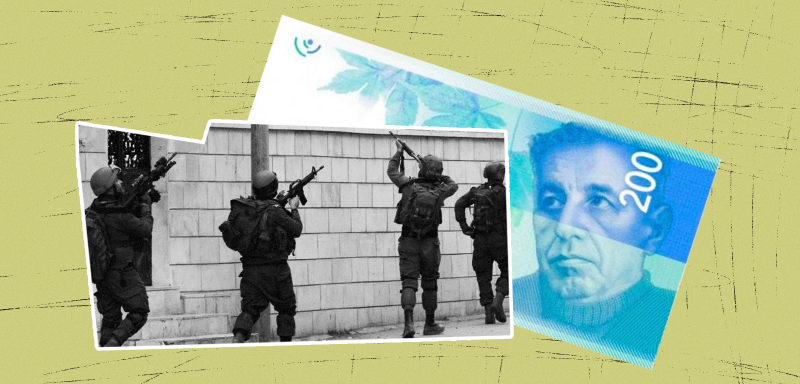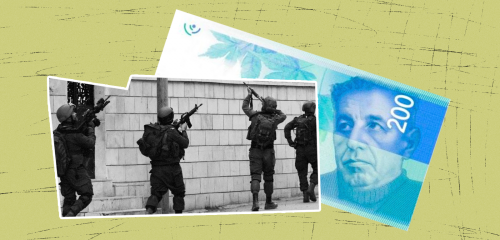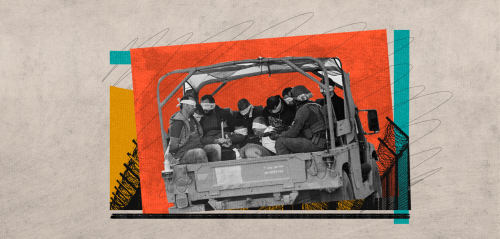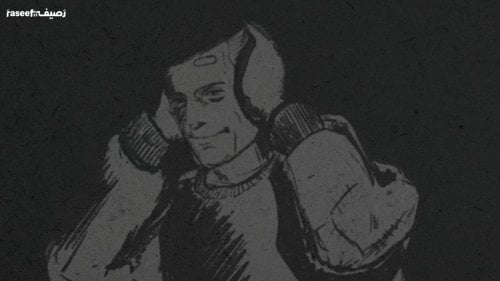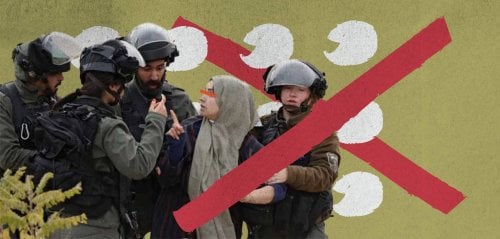On the 15th of January, Iman Nafe was shocked to find a large group of armed Israeli occupation forces invading the home she shares with her husband Nael al-Barghouthi, the world's longest-serving prisoner according to Guinness World Records in 2009. Al-Barghouthi has been imprisoned by Israel without charge for 43 years now. Occupation forces ransacked the house, located in the village of Kobar in the Ramallah district, stealing 2,000 shekels (approximately $540 US), and confiscating her car. “Keep 200 shekels for your expenses,” a soldier mockingly told her before leaving. Nafe, a former prisoner herself, was saving this money to pay off a debt.
That same night, in the town of Beit Rima in the Ramallah district, Israeli forces raided the house of Majdi Rimawi, a prisoner who has been jailed for 22 years. He has been sentenced to life imprisonment plus 80 years on charges of planning and participating in the assassination of Israeli Tourism Minister Rehavam Ze'evi in 2001. “They broke everything in the house and stole our salaries,” Fathiya al-Rimawi, his wife, tells Raseef22.
“Keep 200 shekels for your expenses,” a soldier mockingly told Iman after invading her home, ransacking every room, stealing 2,000 shekels (around $540 USD), and confiscating her car. Iman, a former prisoner, was saving this money to pay off a personal debt.
It has become a regular occurrence for Israeli forces to target the homes of the families of prisoners serving lengthy sentences by blowing up their front doors, destroying their belongings, stealing money or gold jewelry, or confiscating cars. Families of these prisoners are already suffering under difficult economic conditions. These recurrent scenes of abuse in the West Bank are not dissimilar to the daily and systemic intimidatory practices posted by occupation soldiers on social media. There have been many images and videos circulated online showing Israeli soldiers looting houses, properties, businesses, and safes in Gaza, with no accountability. These scenes are a natural extension of the Israeli colonialism prevalent since the Nakba, a policy that allows the theft of land, books, food, culture, property, and even the salaries from the pockets of Palestinians.
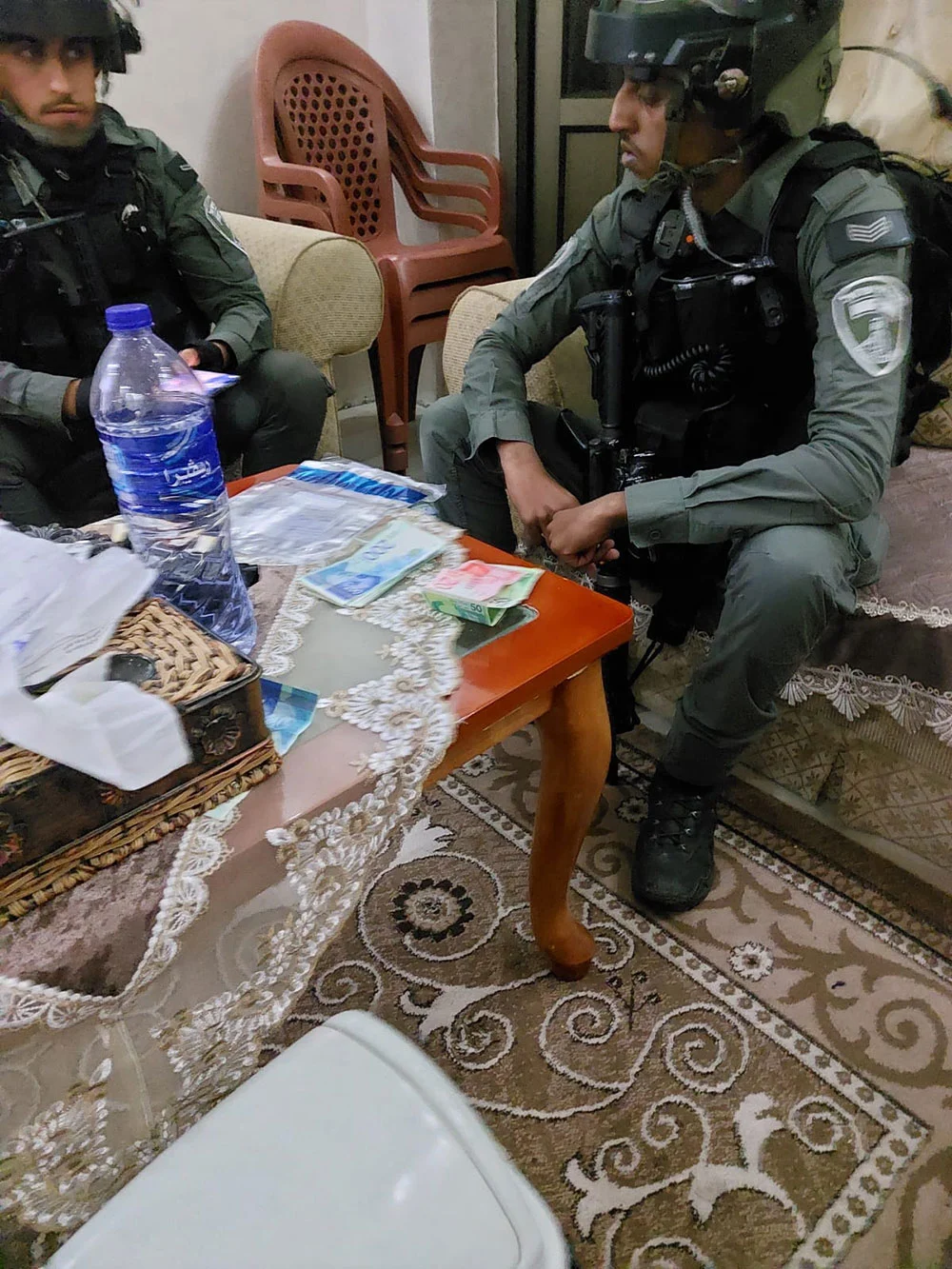 Israeli occupation soldiers inside the house of prisoner Majdi Rimawi in Beit Rima, Ramallah
Israeli occupation soldiers inside the house of prisoner Majdi Rimawi in Beit Rima, Ramallah
Prisoners' wives targeted
“We were surprised by the raid on our house, especially as Nael was arrested again 10 years ago. The soldiers left nothing untouched. Even the photograph of my husband was not spared – they tore it up. It was an old photo, so I have no way to replace it,” Nafe told Raseef22, pointing out that these new policies are in addition to the crimes that are already being committed against prisoners and their families following October 7, 2023. Visits to inmates at prisons have since been canceled, and communication with prisoners has also been cut.
Nael al-Barghouti was first arrested in 1977 on charges of resisting the occupation, and was sentenced to life imprisonment and another 18 year prison sentence. In 2011, he was released as part of the Wafa al-Ahrar (Faithful to the free) deal. Nafe and al-Barghouti were married during this time, living together in the village of Kobar for two and a half years. He was arrested again in 2014, and sentenced to 30 months in prison. Despite completing his sentence, the occupation refused to release him and reapplied his previous sentence, citing the existence of a classified file in his case.
Videos circulating online show Israeli soldiers looting houses, properties, businesses, and safes in Gaza. These scenes are a natural extension of the Israeli colonialism prevalent since the Nakba, a policy that allows the theft of land, books, food, culture, property, and even the salaries from the pockets of Palestinians.
Fathiya al-Rimawi recounts a similar tale. “After occupation forces broke our door, they began their process of smashing, destroying, and vandalism, including on the second floor apartment where Majdi’s son lives. They destroyed the furniture and everything else they came across. Even cans of food were opened and emptied out in the trash,” explains Fathiya. She was shocked to discover that a sum of money she had set aside for a specific expense would be stolen by the soldiers for “supporting terrorism.” The soldiers also seized a similar amount of money from Majdi’s daughter-in-law, before leaving the two homes with a trail of destruction and 6,000 shekels in their hands.
Before leaving, a soldier took out a paper addressed to Majdi Rimawi in Arabic, which stated that, under the current state of emergency, soldiers have the right to inspect the private properties of prisoners if suspected of “receiving money from an illegal organization and manufacturing combat means.” At the bottom of this piece of paper, Rimawi was asked to “pay a fine or compensation to the commander of the Israeli Forces, by decision of the military court.” His wife says, “They told me to sign the paper, saying I can refer to the relevant authorities in the army to go pay. But I refused to sign. So, they took the money and left me a copy of this paper.”
Prisoners’ wives are most affected by the Israeli systemic policy of stealing and looting Palestinian homes and personal belongings.
Amani Srahneh, spokesperson for the Prisoners Club, tells Raseef22, “The wives of prisoners are the ones most affected by this policy of stealing and looting, as they are the main providers for their families with their husbands behind bars. The theft of money and gold, and the confiscation of properties like cars constitute an additional hardship for them. This suffering adds to the suffering of the prisoners themselves, which has been exposed through testimonies given by former prisoners or lawyers. Nael al-Barghouti was beaten while being transferred from Ofer Prison to Gilboa Prison, and his health deteriorated last December. His wife learned through his lawyers that he had lost 10 kilograms due to the policy of starvation practiced against the prisoners.”
After October 7th
“Theft is not a new policy, but we have witnessed, after the 7th of October, an increase and further intensity in the robberies during the invasion of prisoners' homes and those of martyrs as well. Hardly a day goes by without us documenting a testimony in this regard,” explains Srahneh. Last week witnessed dozens of invasions of Palestinian villages and towns in the West Bank, suggesting that October 7 has ‘permitted’ scenes of revenge against Palestinians, wherever they are. The homes of prisoners' families have been targeted, especially those sentenced to life, and others have been detained administratively with no formal accusations under the pretext of having a confidential file. Additionally, the occupation has adopted a policy of confiscating property, stealing money, and conducting a humiliating inspection of the wives of prisoners and other members of their families, according to the Palestinian Prisoners Club.
The home invasions and looting that occur in Gaza, especially in the north, are being committed in the dark away from the lenses of cameras. In a statement issued late last year, the Euro-Med Human Rights Monitor said that the “Israeli army has unleashed its soldiers in the Gaza Strip to not only kill, but to engage in immoral activities” and carry out immoral acts against Palestinian civilians “such as property theft and looting during raids on Palestinian civilian homes.” Israeli media confirmed that the Israeli army has so far seized amounts exceeding 15 million shekels (about $4 million US), which have since been transferred to the Ministry of Security and will later be transferred to the State Treasury.
Nadia (pseudonym), 28, who has been displaced with her family from northern Gaza, says that the occupation soldiers stole a safe from her house containing gold jewelry and money for her father, who works as a gold merchant. “When the occupation soldiers arrived in the south, near our house, we were forced to flee with nothing but the clothes we had on. We couldn't take anything with us. We later learned that our house was partially demolished and that the safe was completely emptied,” says Nadia.
“After occupation forces broke our door, they destroyed our furniture and everything else they came across. Even cans of food were opened and emptied out in the trash,”
A history of looting and theft legalized by Israeli law
Looting and theft by Israeli soldiers is approached in two ways. The first is individual theft, or what is referred to as “spoils” as is currently taking place in Gaza, which means that everything seized in a war becomes Israeli property.
The second is “legal confiscation by a decision of the Israeli army,” which dates back to 1948 when Haganah gangs seized the properties of Palestinians. Today, we can trace part of these thefts, such as that of books now present in the National Library at the Hebrew University, from the archives of the libraries of Khalil Sakakini, al-Nashashibi, and many others, according to Walid Habbas.
Israeli media confirmed that their army has so far seized amounts exceeding 15 million shekels (about $4 million US) from Palestinian homes, which has since been transferred to the Ministry of Security and will later be transferred to the State Treasury
Walid Habbas, a researcher at the Palestinian Forum for Israeli Studies (MADAR), tells Raseef22, “Some of these thefts come under the framework of an Israeli law approved by the Knesset in 2019, which stipulates deducting the salaries of prisoners from Palestinian clearance funds, which are tax revenues, fees, and customs imposed on goods and merchandise imported into Palestine through Israel and across crossings and borders, according to the Oslo Agreement. Israeli Ministry of Finance teams collect them monthly on behalf of the Authority and transfer them to the Ministry of Finance and the treasury of the Palestinian Authority.”
According to Habbas, “under this law, proposed by the then head of the Israeli Shin Bet, Avi Dichter, the Palestinian Authority is prohibited from transferring salaries to the families of prisoners. When Benjamin Netanyahu's right-wing government was formed in 2022, this law was developed for the first time, and a list of names of Jerusalemite prisoners was prepared. The Israeli police raided the homes of 20 released prisoners in the city of Jerusalem, seizing their properties, including money, cars, electrical appliances, and even the gold jewelry belonging to their wives, considering it as property purchased with money from the Palestinian Authority. Now, Israel has begun implementing this policy on the homes of prisoners in the West Bank, as part of a political message from Netanyahu's government to the Palestinian Authority that this authority has no political rule in the areas of the West Bank, and that Israeli laws apply in its territories.”
It comes as no surprise that Palestinian possessions and money are plundered, in line with the treatment of and regard for Palestinian lives, which are considered dispensable. It is also unsurprising that the soldiers of a state, founded on the very principle of theft, will display victory and pride as they loot and steal from the homes of Palestinians.
Raseef22 is a not for profit entity. Our focus is on quality journalism. Every contribution to the NasRaseef membership goes directly towards journalism production. We stand independent, not accepting corporate sponsorships, sponsored content or political funding.
Support our mission to keep Raseef22 available to all readers by clicking here!
Interested in writing with us? Check our pitch process here!
